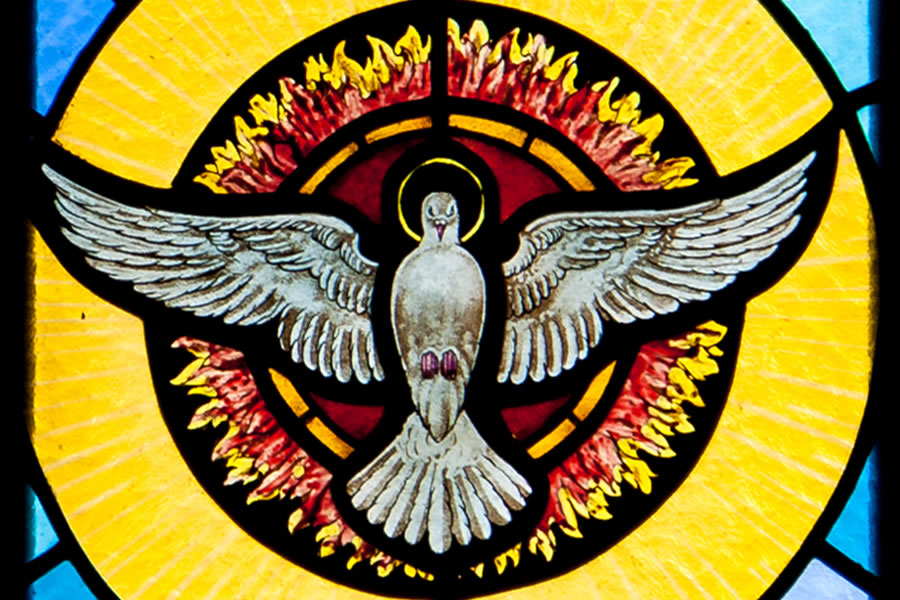St. Francis of Assisi Weekly Reflections

Serving Others Through Love
06-26-2022Weekly ReflectionWe Celebrate Worship Resource, Vol. 47, No. 2As Jesus made his way to Jerusalem and the destiny he had chosen to face, the cost of his faithfulness to his Father and that of his mission were coming into sharp focus. This provides some context for Jesus’ high expectations of potential disciples at this time. Jesus belongs about his Father’s business. He did so when visiting Jerusalem as a boy. He will now when returning to Jerusalem as a man. Each time he had to leave his own mother, family, and home. He expects the same of his disciples. Discipleship—for them, for us—is a one-way street. There may be lots of good reasons to backtrack for something important or take a detour when something comes up, but discipleship demands a steady commitment to a goal. The goal is eternal life with the Lord and the commitment we entered into in baptism. We didn’t know what we were getting into then and we don’t know what’s in store for us now. Paul gives us a good roadmap as any when he explains to the Galatians that to love your neighbor as yourself means to “serve one another through love” (5:13). Serving one another through love keeps us on that road. So we continue forward, trusting in our collective mission, our eyes on the fullest expression of love, who is our hope and our final destiny.
How will you serve someone else through love this week?
Sirviendi al Prójimo por Amor
Mientras Jesús se dirigía a Jerusalén y al destino que había elegido enfrentar, el costo de su fidelidid a su Padre y el de su misión se estaban poniendo claramente en foco. Esto proporciona un contexto para las altas expectativas de Jesús de los discípulos potenciales en este momento. Jesús pertenece a los negocios de su Padre. Lo hizo cuando visitó Jerusalén cuando era niño. Lo hará ahora cuando regrese a Jerusalén como hombre. Cada vez tuvo que dejar a su propia madre, familia y hogar. Él espera lo mismo de sus discípulos. El discipulado—para ellos, para nosotros—es una calle de sentido único. Puede haber muchas buenas razones para dar marcha atrás en algo importante o tomar un desvío cuando surge algo, pero el discipulado exige un compromiso constante con una meta. La meta es la vida eterna con el Señor y el compromiso que asumimos en el bautismo. No sabíamos en lo que nos estábamos metiendo entonces y no sabemos lo que nos espera ahora. Pablo nos da un buen mapa cuando les explica a los gálatas que amar a tu prójimo como a ti mismo significa “servirnos los unos a los otros por amor” (5:13). Servirnos unos a otros a través del amor nos mantiene en ese camino. Así seguimos adelante, confiados en nuestra misión colectiva, con la mirada puesta en la expresión más plena del amor, que es nuestra esperanza y nuestro destino final.
¿Cómo servirás a tu prójimo a través del amor esta semana?
Don't Look Back
06-26-2022Question of the WeekReading I: 1 Kings 19:16b, 19-21 - Call of Elisha
Reading II:Galatians 5:1, 13-18 - Proper use of freedom
Gospel: Luke 9:51-62 - The apostles' requirment
Key Passage:
Another said, "I will follow you, Lord; but let me first say farewell to those at my home.” Jesus said to him, “No one who puts a hand to the plow and looks back is fit for the kingdom of God.” (Lk. 9:61–62)
Adults: When have you faltered or looked back during your journey of faith?
Kids: What can you do to be a stronger follower of Jesus this week?
No Mires Atrás
Lectura I: 1 Reyes 19:16b, 19-21 - Llamado de Eliseo
Lectura II: Gálatas 5:1, 13-18 - Uso apropiado de la libertad
Evangelio: Lucas 9:51-62 - Los requisitos de los apóstoles
Pasaje Clave:
Otro le dijo: "Te seguiré, Señor; pero déjame primero despedirme de mi familia”. Jesús le contestó: “El que empuña el arado y mira hacia atrás, no sirve para el Reino de Dios.” (Lucas 9:61–62)
Adultos: ¿Cuándo ha vacilado o ha mirado hacia atrás durante su camino de fe?
Niños: ¿Qué puedes hacer para ser un seguidor más fuerte de Jesús esta semana?
True Authority
06-19-2022Question of the WeekReading I: Genesis 14:18-20 - The priest Melchizedek
Reading II: 1 Corinthians 11:23-26 - The Eucharist
Gospel: Luke 9:11b-17 - Feeding the 5,000
Key Passage:
Then taking the five loaves and two fish, and looking up to heaven, he said the blessing over them, broke them, and gave them to the disciples to set before the crowd...(Luke 9:16)
Adults: Have you had an experience of not having enough of some gift or grace, then receiving more than enough? What happened?
Kids: What do you have a little of that you can share with someone who has less?
Verdadera Autoridad
Lectura I: Génesis 14:18-20 - El sacerdote Melquisedec
Lectura II: 1 Corintios 11:23-26 - La Eucaristía
Evangelio: Lucas 9:11b-17 - Alimentar a los 5.000
Pasaje Clave:
Y tomando los cinco panes y los dos pescados, levantando los ojos al cielo, los bendijo, y los partió, y dio a sus discípulos para que los pusiesen delante de la gente. (Lucas 9:16)
Adultos: ¿Has tenido la experiencia de no tener suficiente de algún don o gracia, y luego recibir más que suficiente? ¿Qué sucedió?
Niños: ¿Qué tienes un poco de eso que puedes compartir con alguien que tiene menos?

The Kingdom of God is Among You
06-19-2022Weekly ReflectionWe Celebrate Worship Resource, Vol. 47, No. 2Luke tells us that before multiplying the loaves and fishes, “Jesus spoke to the crowds about the kingdom of God” (9:11). That’s no surprise. In Luke’s Gospel, Jesus spoke about the kingdom of God constantly. It is the inheritance of the poor (6:20). It is filled with good news (8:1). It is like a mustard seed: tiny, but producing a huge bush (13:19). It is like a sprinkle of yeast that leavens a whole batch of dough (13:21). It is where those who were last will be first (13:30). It is to be accepted like a child (18:17). It is more difficult for a rich person to enter than a camel to pass through a needle’s eye (18:25). It is promised to the good thief on the cross (23:43). Today it is here among thousands of people, hungry and tired at the end of a long day, lacking any food but five loaves and two fish, but where after Jesus blessed these ridiculously meager provisions and the disciples passed them out, they ate and ate and were satisfied and still had more. Perhaps some in the crowd realized that this was exactly what Jesus had just spoken about. “For behold, the kingdom of God is among you” (17:21).
How have you experienced the kingdom of God among you?
El Reino de Dios esta entre Ustedes
Lucas nos dice que antes de multiplicar los panes y los peces, “Jesús habló del Reino de Dios a la multitud” (9:11). Eso no es sorpresa. En el Evangelio de Lucas, Jesús habla constantemente del Reino de Dios. Es la herencia de los pobres (6:20). Está lleno de buenas noticias (8:1). Es como una semilla de mostaza: diminuta, pero que produce una gran zarza (13:19). Es como un poco de levadura que fermenta toda una masa (13:21). Es donde los últimos serán los primeros (13:30). Es ser aceptado como un niño (18:17). Es más difícil que entre un rico que pasar un camello por el ojo de una aguja (18:25). Se promete al buen ladrón en la cruz (23:43). Hoy está aquí entre miles de personas, hambrientas y cansadas al final de un largo día, sin más alimento que cinco panes y dos pescados, pero después de que Jesús bendijo estas provisiones ridículamente escasas y los discípulos las repartieron, comieron y comieron y estaban satisfechos y aún tenían más. Quizás algunos en la multitud se dieron cuenta de que esto era exactamente de lo que Jesús acababa de hablar. “Porque he aquí, el reino de Dios está entre ustedes” (17:21).
¿Cómo has experimentado el Reino de Dios “entre ustedes”?
The Spirit of Truth
06-12-2022Question of the WeekReading I: Proverbs 8:22-31 -The discourse of wisdom
Reading II: Romans 5:1-5 - Faith, hope, and love
Gospel: John 16:12-15 - Coming of the paraclete
Key Passage:
Jesus said, "I still have many things to say to you, but you cannot bear them now. When the Spirit of truth comes, he will guide you into all the truth; for he will not speak on his own, but will speak whatever he hears, and he will declare to you the things that are to come.”
(Jn. 16:12–13a)
Adults: In what difficult situation has the Holy Spirit helped you see more clearly?
Kids: What kind of decision can the Holy Spirit help you with?
El Espíritu de la Verdad
Lectura I: Proverbios 8:22-31 -El discurso de la sabiduría
Lectura II: Romanos 5:1-5 - Fe, esperanza y amor
Evangelio: Juan 16:12-15 - Venida del paráclito
Pasaje Clave:
discípulos: “Aún tengo muchas cosas que decirles, pero todavía no las pueden comprender. Pero cuando venga el Espíritu de verdad, él los irá guiando hasta la verdad plena, porque no hablará por su cuenta, sino que dirá lo que haya oído y les anunciará las cosas que van a suceder.” (Juan 16:12–13a)
Adultos: ¿En qué situación difícil te ha ayudado el Espíritu Santo a ver con más claridad?
Niños: ¿Con qué tipo de decisión te puede ayudar el Espíritu Santo?

Father, Son and Holy Spirit
06-12-2022Weekly ReflectionWe Celebrate Worship Resource, Vol. 47, No. 2We tend to think of the three members of the Holy Trinity as having three distinct roles. God the Father is our Creator, God the Son is our Redeemer, and God the Holy Spirit is our Sanctifier. But the distinctions are not so clear-cut in reality. Like the wisdom of God, personified by the author of Proverbs, the Spirit “was poured forth, at the first, before the earth” (8:23). John himself tells us, “In the beginning was the Word, and the Word was God” (1:1). Though the Son and Holy Spirit did not come to us until much later, God has always been Triune. What’s more, as Jesus tells his disciples, “Everything that the Father has is mine; ...(the Holy Spirit) will take from what is mine” (John 16:15). The members of the Trinity give completely of themselves to each other. This perfect generosity is a sign of the Triune love of God, a love that has, in turn, been given to us, “poured out into our hearts through the Holy Spirit” (Romans 5:50).
How can you express the generosity of the Trinity in the way you treat others?
Padre, Hijo y Espritu Santo
Tendemos a pensar que los tres miembros de la Santísima Trinidad tienen tres roles distintos. Dios Padre es nuestro Creador, Dios Hijo es nuestro Redentor y Dios Espíritu Santo es nuestro Santificador. Pero las distinciones no son tan claras en la realidad. Como la sabiduría de Dios, personificada por el autor de Proverbios, el Espíritu “fue derramado, desde el principio, antes de que la tierra existiera” (8:23). El mismo Juan nos dice: “En el principio era el Verbo, y el Verbo era Dios” (1:1). Aunque el Hijo y el Espíritu Santo no vinieron a nosotros hasta mucho después, Dios siempre ha sido Trino. Es más, como dice Jesús a sus discípulos: “Todo lo que tiene el Padre es mío; ...(el Espíritu Santo) tomará de lo mío” (Juan 16:15). Los miembros de la Trinidad se dan completamente unos a otros. Esta generosidad perfecta es un signo del amor trino de Dios, un amor que, a su vez, nos ha sido dado a nosotros, “derramado su amor en nuestros corazones por el Espíritu Santo” (Romanos 5:50).
¿Cómo puedes expresar la generosidad de la Trinidad en la forma en que tratas a los demás?

Peace be with You
06-05-2022Weekly ReflectionWe Celebrate Worship Resource, Vol. 47, No. 2Today we hear only of the Holy Spirit coming down upon the apostles, but also of the witnesses in the streets of Jerusalem. People from all over the known world could hear the disciples speaking in their own tongue. The author of Acts goes on to say that after listening to Peter thousands of people chose to be baptized. The Holy Spirit came down and transformed the lives of the apostles, but immediately went on to transform the lives of thousands of others. We are those witnesses now. Like them, we received the Holy Spirit at baptism. Like them, we are diverse, with varied backgrounds, speaking different languages. The Holy Spirit also helps us understand each other and recognize the way we each express the glory of God. The Holy Spirit Helps us understand the cries of the family at the border fleeing fear and desperation, the hopes of the young person desperate for an opportunity, the pleas of the older person who was just laid off, the grief of those who lost family and friends in the pandemic. With the Holy Spirit, we gain the ability to truly understand each other, to bridge our differences—differences that flow from the mighty acts of God—while recalling the first word the risen Lord pronounced to his disciples: Peace.
How can you express the peace that Jesus left us to those with whom you have differences?
La paz este con ustedes
Hoy escuchamos no solo que el Espíritu Santo descendió sobre los apóstoles, sino también de los testigos en las calles de Jerusalén. Personas de todo el mundo conocido podían escuchar a los discípulos hablando en su propia lengua. El autor de Hechos continúa diciendo que después de escuchar a Pedro, miles de personas optaron por bautizarse. El Espíritu Santo descendió y transformó la vida de los apóstoles, pero inmediatamente pasó a transformar la vida de miles de personas. Nosotros somos esos testigos ahora. Como ellos, recibimos el Espíritu Santo en el bautismo. Al igual que ellos, somos diversos, con antecedentes variados, hablamos idiomas diferentes. El Espíritu Santo también nos ayuda a entendernos unos a otros ya reconocer la forma en que cada uno expresa la gloria de Dios. El Espíritu Santo nos ayuda a comprender los gritos de la familia en la frontera que huye del miedo y la desesperación, las esperanzas del joven desesperado por una oportunidad, las súplicas del anciano que acaba de ser despedido, el dolor de quien perdió a su familia y amigos en la pandemia. Con el Espíritu Santo, adquirimos la capacidad de entendernos verdaderamente unos a otros, de unir nuestras diferencias, diferencias que se derivan de los actos poderosos de Dios, mientras recordamos la primera palabra que el Señor resucitado pronunció a sus discípulos: Paz.
¿Cómo puedes expresar la paz que Jesús nos dejó a aquellos con quienes tienes diferencias?
Gift for Service
06-05-2022Question of the WeekReading I: Acts 2:1-11 - Descent of the Holy Spirit
Reading II: 1 Corinthians 12:3b-7, 12-13 - Many gifts, one Spirit, and the analogy of the body
Gospel: John 20:19-23 -Appearance to the disciples
Key Passage:
Now there are vareties of gifts, but the same Spirit; and there are varieties of services, but the same Lord. (1 Cor. 12:4–5)
Adults: What gift of service have you received from the Holy Spirit and how well are you using it right now?
Kids: What gift do you hope to receive from the Holy Spirit? How could you use it to serve others?
Dones de servicio
Lectura I: Hechos 2:1-11 - Descenso del Espíritu Santo
Lectura II: 1 Corintios 12:3b-7, 12-13 -Muchos dones, un solo Espíritu y la analogía del cuerpo Evangelio
Evangelio: Juan 20:19-23 -Aparición a los discípulos
Pasaje Clave:
Hay diferentes dones, pero el Espíritu es el mismo. Hay diferentes servicios, pero el Señor es el mismo. (1 Corintios 12:4-5)
Adultos: ¿Qué don de servicio has recibido del Espíritu Santo y qué tan bien lo estás usando en este momento?
Niños: ¿Qué regalo esperas recibir del Espíritu Santo? ¿Cómo podrías usarlo para servir a otros?